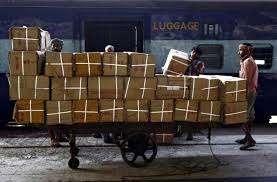Only interstate sale of goods would be imposed one per cent tax
 A key recommendation of the Rajya Sabha’s select committee to confine one per cent tax over the proposed goods and services tax to only the interstate movement of goods, which are for a consideration, would considerably reduce the contentious cascading effect of the levy, but would not completely eliminate it.
A key recommendation of the Rajya Sabha’s select committee to confine one per cent tax over the proposed goods and services tax to only the interstate movement of goods, which are for a consideration, would considerably reduce the contentious cascading effect of the levy, but would not completely eliminate it.
Besides, the fears expressed by Chief Economic Advisor Arvind Subramanian that imports may be cheaper in some cases than the effect of this one per cent tax -- which would be imposed each time goods move from one state to other -- would also lessen, but won’t end.
The Constitution Amendment Bill, passed by the Lok Sabha earlier, has a provision of one per cent additional tax over GST for interstate supply of goods to help producing states since GST is a destination-based tax.
However, this drew flak from industry and experts, who claimed it would have a cascading effect.
To balance the interests of the two sides, the panel is understood to have recommended the proposed GST law read that interstate movement of goods won’t be taxable if it is without a consideration.
This means that only interstate sale of goods would be imposed one per cent tax and not what is called depot or branch transfer, explained Satya Poddar, tax partner, Policy Advisory Group, EY.
In layman’s term, it means that if stocks are transferred from say a plant in a state to a depot of the same company in another state, these would not invite tax.
It is the same as the central sales tax since it too does not apply to depot or branch transfers, Poddar said.
However, in CST Act, the word 'sale' is used, instead of 'for a consideration' proposed by the select panel, but the effect would remain the same.
It should be noted that CST, which is a levy on interstate sale of goods, would go once GST is introduced. CST currently stands at two per cent.
Poddar believes that 75 per cent of interstate transfers of goods is a stock transfer.
Most of the companies say fast-moving consumer goods and pharmaceutical firms do these kinds of transfer.
However, it is not prevalent that much in auto sector, because of complications in setting up these warehouses in various states, he said.
“In a way, I will say that a jail-term has been converted to a jail-term with a bail,” he said, adding market distortions would remain. Concurred Naresh Thaacker, partner, Economic Laws Practice.
“The recommendation would address the cascading effect to a great extent, but would not do away with it,” Thaacker said.
That is why he said some Opposition parties have asked for completely doing away with the tax.
The Congress, meanwhile, has dug in its heels on this issue as it views this as a 'market distortion' mechanism.
Earlier when the Lok Sabha had passed the Bill, Subramanian had said the proposed tax would harm the Make in India campaign.
“Think of a good going from Gujarat to Tamil Nadu, crossing four states.
"The good would embody an additional tax of about 4-5 per cent, because it is one per cent every state.
"That might make it easier to import into Tamil Nadu from Bangkok,” Subramanian had said.
Poddar said the fear of one per cent tax making imports in some cases would still be there, though it has receded with the select panel’s recommendation.
He said it all depends on whether interstate movement of goods is for the purpose of sale or is a stocks transfer.
There is, however, still ambiguity in the proposed tax that does not address Subramanian’s apprehensions.
While the law specifies that this tax is to be levied by the Centre and given to states from where the supply of good originates, there is ambiguity whether it will be levied at the final consumption point or at every border that it crosses, said Mandira Kala of PRS Legislative Research.
The select panel has recommended it would only be liable for goods where interstate movement would be for a consideration, the imposition of this tax on all such goods would lead to additional burden on the consumer, she added.










